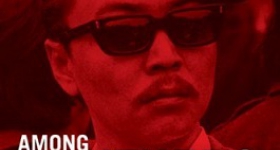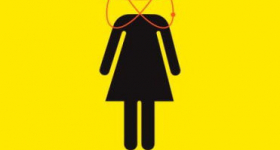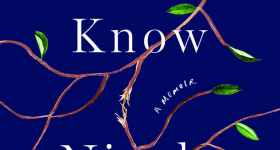Communication is key in David Mura's work. The esteemed writer, poet and activist recently released his latest book of poetry, The Last Incantations (Northwestern University Press), and though he covers a wide range of topics in his latest works, the underlying message of the collection is clear: we are all more human when we learn to connect better with one another and with ourselves.
In Incantations, Mura writes with unflinching honesty about the struggles of finding identity as an Asian American, and emphasizes the importance of keeping that dialogue alive in the next generation. Here, he tells Hyphen about his writing process, what first prompted his interest in Asian American issues, and why it is important for writers of color to take ownership of their identities.
Read Hyphen’s review of The Last Incantations.
Hyphen: The title of your collection, The Last Incantations, instantly conjures up images of magic, religion, and perhaps even a little bit of magical realism. The events and people you detail in these poems are very vivid and three-dimensional, however, so I wonder if the title is actually a bit tongue-in-cheek, a nod to how Asian Americans and other minorities are still exoticized and seen as mystical among the larger American audience? Could you talk a bit about the inspiration for the title and its significance?
David Mura: The title comes from a poem in the book, “The Last A.A. Incantations.” By A.A. I mean Asian American but I thought that might be read as Alcoholics Anonymous. Part of the poem stems from the experience of my friend, the terrific poet, Bao Phi, who was delivering pizzas in South Minneapolis when a guy with a gun confronted him, and Bao just went off:
Just so a young Vietnamese friend
delivering on Cedar Ave.
told the mugger, You going
to shoot me for a pizza? A pizza?
Go right ahead, motherfucker.
The guy slunk off in the night
confused by death
in the guise of a gook faced
pizza boy, muttering his own
ending to the world.
So the “last incantations” for me is partly about an Asian American voice standing up to the world, proclaiming our existence, our right to be here, amid the absurdities of our position within the American racial landscape. It’s about the righteousness and forthright voice of a Yuri Kochiyama, a [recently passed] longtime Harlem-based Japanese American political activist and friend to Malcolm X. It’s about the ways Asians in America have been underestimated, reduced to ridiculous stereotypes, forces that would kill our spirit, if not our bodies, and how we have persisted and persevered. And, on a personal level, it’s about my own mortality and how I wrote these poems, these prayers and chants to accept what’s coming and yet, it’s also about my not giving in, continuing to fight. It’s about laughing in the face of it, just to survive and remain sane.
Hyphen: In terms of process, what usually sparks your urge to pen a poem--is it an image you want to convey? A sensation? A story? Your form clearly reflects your work as much as the content, so I’d be curious to know which usually comes first: the concept, the rhythm, the images, or the words?
DM: I’m a Jungian in terms of my approach to the writing and psyche. Many gods, many voices. And a variety of forms helps with accessing the polyvocal nature of the psyche. At the same time, sometimes in the process of revision, a form begins to emerge, whether loose, as in say, four line stanzas, or something more structured with meter and rhyme.
Sometimes I’ll pick a general subject or theme and write about it, over and over. This often occurs when I realize I’m embarked on a long poem, like “Things That Lose About Being Painted,” which is about a Sansei man and woman—third generation Japanese Americans—conducting an affair. With such a work, I’ll let myself try many different approaches to the theme or subject, varying forms and language, just seeing what I come up with.
I often tell students, “Writing is a chess game between you and your unconscious.” Generally, your conscious mind makes the first move, but if the writing’s going to come alive, the unconscious has to begin to speak. One way the unconscious speaks is simply where the writing is the strongest, the most powerful or vivid, where the language comes alive. I don’t determine which form or lines or paragraphs come alive; I have to let the language help guide where the poem is going or what enters into the poem.
Sometimes I won’t start even with a specific subject or theme, but just playing around with language. Richard Hugo in the Triggering Town helped teach me that approach. He reasoned that wherever you ostensibly start, your deep obsessions are going to come out in some way, so you don’t necessarily always start with a subject or theme you’re familiar with or have approached before. The language, through sound and other sorts of associations, brings forth more language and you simply follow the process. Sometimes it leads to shit; sometimes to something you might use. Writing is experimentation, not an efficient assembly line production of a product.
Hyphen: There is something very unflinching about your tone even as you tackle the heavier issues of race, culture, sexuality, and identity–what it means to be a Sansei, and how growing up as a hyphenated American still affects you now. Are there any topics that still give you pause when you try to write about them, or any themes that you find more difficult to address (either because of their charged implications or their more personal nature)?
DM: I think there are themes or subject matter that I’ve approached before and so feel less compelled to go there again. I’ve written a fair amount about the internment camps, and I don’t know how many more investigation or discoveries there are for me in that area.
In this new book, I’m exploring more the connections between people of color, often starting with a personal connection or a connection a character or historical personage might invoke. So often people of color think mainly in terms of either addressing their own group or white people rather than in the history of interactions and communications that take place all the time between people of color. In The Last Incantations, there’s poems about the connection between the Japanese American and Native American cannery workers up in Alaska, about Yuri Kochiyama’s presence at Malcolm X’s assassination, about the intersections I’ve experienced with the Palestinian American poet Suheir Hammad or the African American poet Patricia Smith. Or how the head of the Wartime Relocation agency, which administered the internment camps, went on to become head of the Bureau of Indian Affairs.
Though I’ve written often about race and sexuality, I still feel there’s much more I can explore in that area. And I still feel a sense of trepidation in approaching the subject. That’s why I’m so excited by a writer like Hilton Als who, in his essay collection White Girls, works the lenses of race and gender and orientation in new and subtle ways, exposing and exploring complexities we always knew were there in the culture but were never quite able to express or identify. His “fictional” essay of an interview with an imaginary B-actress movie star sister of Richard Pryor is layered, playful in the best ways, and powerfully revealing on race and sexuality.
Hyphen: Your poems are often subtly (or not so subtly) colored by references to your experience as a Japanese American, and the search for identity, and I know you are very involved in the VONA (Voices of Our Nation Arts Foundation) community out on the west coast. Could you speak a bit to the importance of Asian American writers telling the story of their culture and heritage?
DM: I was just speaking to a younger Asian American writer who has been traumatized by her dealings with white colleagues in her department. So often, the stupid and myopic views of the white literary culture attempt to infect and shackle the creative and intellectual energies of writers and academics of color. And oftentimes in institutions, because the writers of color find themselves a small minority amid a white majority, the white majority appears both more powerful and more invulnerable than it actually is. The result is often writers of color are often afraid of or tentative towards writing about their own experiences, the truths of their lives and their families and the history of their communities.
In a place like VONA, writers of color find their experiences and vantage points and writing validated and contextualized by other writers of color. Just as importantly, the students also are connected to a range of literary and intellectual influences that so many of their previous white writing instructors had little knowledge of. You read through the criticism and nonfiction of touted white male novelists like David Foster Wallace or Jonathan Franzen, and they never mention writers or intellectuals of color. Their world—as opposed to the world we all actually live in—is so fucking white and provincial! And yet younger writers of color can think, “Well, those are the powers that be. That’s whom I should be imitating or listening to.”
But at VONA, Anzaldua or Achebe, Jamaica Kincaid or Junot Diaz, Darwish or Faiz, Du Bois or Gwendolyn Brooks, Sei Shonagon or the tradition of the benshi—the live narrators of silent film—in both Japan and Korea (big difference there), they all will be part of the mix. So often writers of color are told that we are simplistic or Manichean or intellectually or culturally narrow when the exact opposite is actually the truth. What’s more, the demographics are on our side; our readership is growing in numbers. And so we have to write for the future of America.
Hyphen: Along that same vein, are there any terms that you deem overused/irritating when it comes to writing about race? For instance, any concepts that you feel are outdated or so delicately PC that they are actually detrimental to opening discussions about our differences?
DM: I understand that certain academic terms like “hegemony” or “intervention” have had their uses. But language needs to be constantly changing and shifting to remain alive. And sometimes it feels to me that writers of color in the academy are using language as much to obfuscate or perform than to actually express and communicate. Also it sometimes happen that outrage or instances where racial issues are cartooned and simplified distract us from deeper and more trenchant approaches. A work like Michelle Alexander’s The New Jim Crow points us to a systemic approach to racial inequities and an analysis that goes beyond simple headlines.
Still, let’s keep things in proportion. The refusal of so many white people on the right and left to deal with race is a far larger problem than any clichéd language or intellectual tics that writers and intellectuals of color may exhibit. And, as I’ve said [in this interview], sometimes writing anything with a white audience in mind can actually work to the detriment of the quality of one’s work. It’s hard to write well if you’re writing to an audience whose ignorance you cannot cure. And who do not want a cure.
Hyphen: How do you combat writer’s block, and what does an average (if there is such a thing!) day of writing look like for you? Are you more of an early morning scribe or a night owl burning the midnight oil (and other such clichés)?
DM: I got drummed from English graduate school with seven incompletes. Massive case of writer’s block. I was helped through that in part by therapy, but the biggest help was reading the essays in William Stafford’s Writing the Australian Crawl. Stafford’s solution to writer’s block? “Lower your standards.” That is, accept whatever comes. Don’t criticize it. Don’t let the superego or hypercritic within silence your voice.
Lower your standards. You write sentences, you can use the language. Accept what comes. That’s the only way more will come. Later you can be critical. When I first started to deal with writer’s block I’d write things and not look at them for six months; that was the only way I could produce work, by not looking at it. (Note: I've got essays about writer's block and the writing process on my blog.)
Hyphen: Can you pinpoint a moment or series of moments that led to your interest in Asian American issues? Has your attitude toward the importance of preserving and finding identity changed over the years (i.e., as a writer living abroad in Japan versus you now as a writer living in the States)?
DM: Two key events shaped my development. In my late twenties I came upon Frantz Fanon’s psychoanalysis of racism in blacks and whites in the French colonial world, Black Skin White Masks. Fanon writes about the black school child in the French West Indies reading books about “our ancestors, the Gauls,” about the white French colonialists going into Africa to civilize the savages. "What is that black school child learning?", Fanon asks. His answer: self-hatred, self-alienation, and an identification with his colonial oppressor.
I read that, and I thought, “Oh, that’s what I’ve been doing.” I started reading black authors and began finding in them a language to talk about race, a language I found completely absent in all the white writers I’d read. I understood that that these black writers were providing me a tool to articulate my own racial identity and position.
A few years later, I went to Japan on a US/Japan Friendship Commission Fellowship from the NEA. I got off the plane and everyone looked like me, and I thought, This is great! In Japan, I discovered in new ways how out of place and alienated I felt growing up in America. I eventually realized that Japan wasn’t my home; despite the title of my memoir about that trip, Turning Japanese, I wasn’t Japanese. But being in Japan forced me to ask and investigate so many questions about the role of Japanese culture in my family and, perhaps even more importantly, the effect of Japanese American history upon my family—especially during the internment. And it was through those questions that I began to articulate what it meant for me to be a Japanese American and an Asian American, the ways that culture and race and history had affected and formed my sense of myself and my place in the world.
Hyphen: What does it mean to you to be an activist? And what is your hope for young emerging writers (both Asian American and not) in terms of the next generation of poets, novelists, critics?
DM: At VONA, our mission is to educate and engage writers of color both in writing and in the pursuit of social justice. Years ago, when I first began to see that political concerns and literary concerns were not mutually exclusive but instead were always intertwined, I found myself at an African American literary conference. At the conference, everyone seemed to accept that literature and political activism were connected. There were none of the sorts of arguments I was having with white writer friends about how any political engagement was not part of a true pursuit of literary values.
We’re coming, I believe, to a time when the issues of racial equity will only move more to the forefront of not just our politics or economics or education, but also in our explorations of culture. Indeed, the forces which are reluctant to address racial equity in the arts are, in many ways, more entrenched and far more resistant to change than say those in government or education. But these areas are all a piece of the whole, and if you are a writer, you have to see the whole of society and how it works, you have to be alive to the world you live in.
I find that my activism, though at times exhausting and time consuming, renews me spiritually. It becomes a field or an arena where I can gauge and learn where the society is at, where things are shifting and where they are stuck. It brings me in touch with various parts of my own community and the communities of others. This all occurred for me in my recent work in the Twin Cities with the Don’t Buy Miss Saigon Coalition and our protests against the racial stereotypes and clichés embedded all through that musical (and the Vietnamese prayer or chant in that isn’t even in Vietnamese; it’s in gibberish!).
At the same time, emotional and psychic truth, the core of creative writing, is not a political platform. It’s too complex, too multilayered. And yet writing about the emotional and psychic truth of the lives of people of color will have a political as well as a literary effect. Because there are powers that be and people who don’t want to hear our truths, who want to silence us.
My activism and my literary work share that purpose. We will not be silenced.
-
Joyce Chen is a second-generation Taiwanese American journalist and currently a first-year candidate for an MFA in Creative Nonfiction at The New School in New York City. Her writings have been published in People magazine, Los Angeles magazine and the Los Angeles Daily News.









Comments